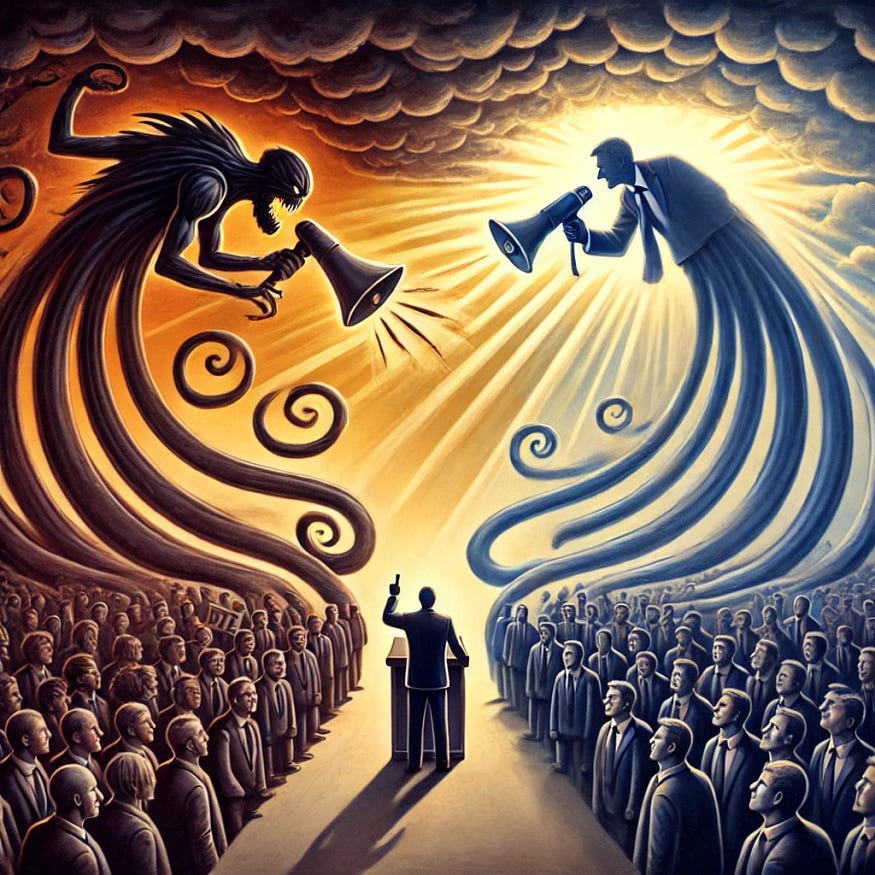When Politicians Sell Hate, Not Love for Their Country, Their Motives Must Be Questioned
Hate-driven rhetoric from politicians often masks self-serving motives, raising crucial questions about their true intentions and the future they envision for the nation.
In any democratic society, the role of politicians is to lead with the best interests of their country and its citizens at heart. They are entrusted with the responsibility to uphold the values of democracy, promote unity, and work towards the common good. However, when a politician chooses to peddle hate instead of fostering love for their country, it raises serious questions about their true intentions and objectives.
The Power of Rhetoric
Words are powerful tools in politics. They can inspire a nation, bring people together, and create a sense of shared purpose. But they can also divide, incite violence, and breed distrust. When politicians use rhetoric that is filled with hatred, anger, and division, it is often a sign that they are pursuing goals that are far removed from the ideals of national unity and prosperity.
Hate-driven rhetoric typically targets specific groups within society, whether based on race, religion, ethnicity, or political ideology. It fosters an “us versus them” mentality, creating scapegoats for societal problems and diverting attention from the real issues that need to be addressed. This kind of rhetoric is not aimed at building a better future for the country; instead, it is a tool for manipulation, designed to consolidate power by exploiting fear and prejudice.
The True Motives Behind Hate
When a politician sells hate, it’s important to scrutinize their underlying motives. Hate is often used as a distraction — an emotional trigger that can shift focus away from critical issues such as economic inequality, healthcare, education, or corruption. By stoking divisions, politicians can divert attention from their own failures or shortcomings and rally a base that is more concerned with fighting perceived enemies than addressing the country’s real challenges.
Furthermore, selling hate can be a tactic to gain and maintain control. Dividing people weakens their collective power and makes it easier for those in authority to suppress dissent, limit freedoms, and undermine democratic institutions. In such scenarios, the politician’s goal is not to benefit the country but to strengthen their own grip on power, often at the expense of the nation’s long-term health and stability.
Love for Country vs. Love for Power
True patriotism is about loving one’s country and working towards its betterment. It involves promoting unity, inclusivity, and the welfare of all citizens. A politician who genuinely loves their country will seek to bring people together, regardless of their differences, and work towards common goals that enhance the nation’s prosperity and ensure justice and equality for all.
In contrast, a politician who promotes hate is often more interested in accumulating power than in serving the country. Their actions are typically self-serving, aimed at creating divisions that they can exploit to their advantage. Instead of fostering a sense of national pride and togetherness, they thrive on discord, knowing that a divided populace is easier to manipulate.
The Cost of Hate-Driven Politics
The consequences of hate-driven politics are severe. It can lead to social unrest, erode trust in public institutions, and even incite violence. When people are pitted against each other, the social fabric of the country begins to tear apart, making it harder to achieve collective goals and address the common challenges facing the nation. In the long run, the country as a whole suffers — economically, socially, and morally.
Moreover, hate-driven politics can damage the country’s international reputation. A nation known for its divisiveness and intolerance is less likely to be respected on the global stage. This can lead to strained diplomatic relations, reduced foreign investment, and a loss of influence in international affairs.

Choosing Leaders Who Lead with Love
As citizens, it is crucial to recognize when a politician is selling hate rather than love for their country. It’s important to critically evaluate their rhetoric, policies, and actions to discern whether they are truly working for the good of the nation or merely seeking to advance their own interests.
In a healthy democracy, leaders should be held accountable not just for what they achieve, but for how they achieve it. A leader who genuinely cares about their country will seek to unite its people, promote peace and understanding, and work tirelessly to create a better future for all citizens. They will lead with compassion, wisdom, and a deep sense of responsibility to the country they serve.
In conclusion, when politicians resort to selling hate, it is a clear signal that their intentions are not aligned with the best interests of the country. Such leaders should be met with skepticism and scrutiny, and their actions should be challenged by those who truly care about the nation’s well-being. Ultimately, the future of any country depends on the ability of its people to choose leaders who lead with love, not hate, and who are committed to the betterment of all.



